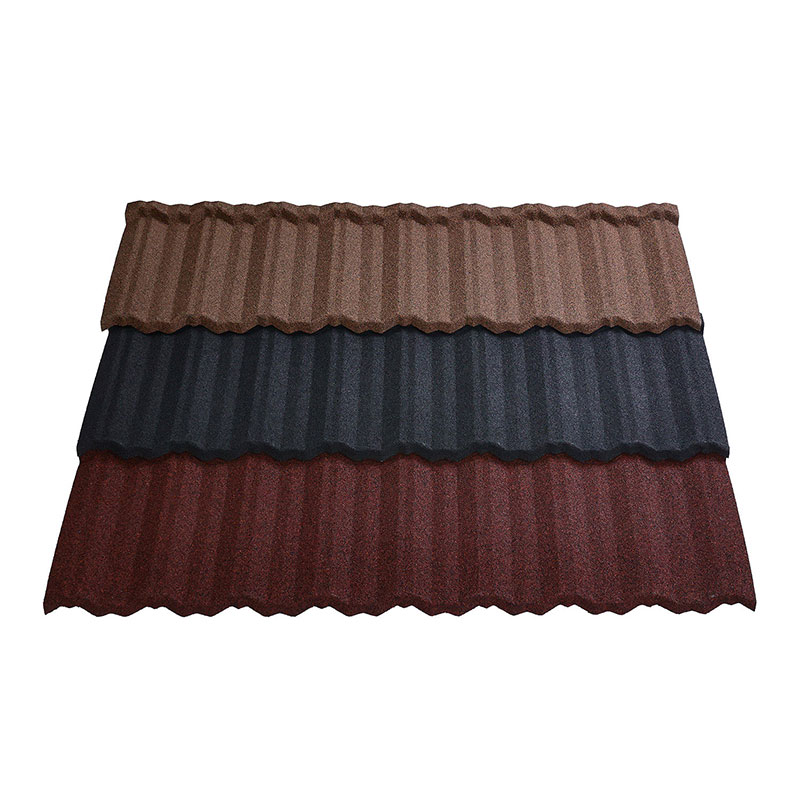Applications of Stone Coated Roofing Tile
2024-07-13
Stone-coated roofing tiles are durable and aesthetically appealing roofing materials that combine the strength of steel with the visual appeal of traditional roofing materials like clay or slate. Here’s an overview of stone-coated roofing tiles:
Construction and Materials:
1. Base Material:
- Steel Core: The base of stone-coated roofing tiles is typically made from galvanized steel or aluminum-zinc alloy-coated steel. This provides strength, durability, and resistance to corrosion.
2. Coating:
- Stone Chips: Small natural stone granules, typically made from ceramic-coated volcanic rock or granite, are bonded to the steel core.
- Adhesive: A durable acrylic resin adhesive is used to bond the stone chips to the steel base, ensuring longevity and weather resistance.
3. Design and Appearance:
- Variety: Available in a wide range of profiles and colors, mimicking traditional roofing materials like clay tiles, wood shakes, or slate.
- Texture: The textured surface created by the stone chips adds dimension and enhances the aesthetic appeal of the roof.
Advantages:
- Durability: Steel core provides strength and impact resistance, while the stone coating enhances durability against weather elements such as UV radiation, hail, and wind.
- Aesthetic Appeal: Offers the look of traditional roofing materials with the added benefits of steel’s strength and longevity.
- Weather Resistance: Resistant to fading, cracking, and warping over time, making it suitable for various climates and weather conditions.
- Lightweight: Lighter than traditional roofing materials like clay or concrete tiles, reducing structural load and installation complexity.
- Low Maintenance: Requires minimal maintenance compared to wood or clay tiles, with a long lifespan.
Applications:
- Residential Roofing: Ideal for homes seeking a traditional or upscale appearance without the maintenance drawbacks of natural materials.
- Commercial Buildings: Used on various commercial structures where durability, aesthetics, and longevity are priorities.
- Coastal Areas: Suitable for coastal regions due to its resistance to saltwater corrosion and high winds.
Installation:
- Professional Installation: Typically installed by roofing professionals familiar with the specific requirements of stone-coated roofing tiles.
- Deck Preparation: Requires a sound and properly prepared roof deck to ensure secure attachment and longevity.
- Fastening: Tiles are fastened using screws or nails through the raised portions of each tile to secure them to the roof deck.
Considerations:
- Cost: Higher initial cost compared to traditional asphalt shingles but often offset by longevity and lower maintenance costs.
- Color and Style: Choose a color and style that complements the architectural style of the home or building.
- Warranty: Check for manufacturer warranties on both the roofing tiles and installation to ensure coverage against defects and installation issues.
Maintenance:
- Inspections: Regularly inspect the roof for loose tiles, damage, or debris buildup that could impact drainage.
- Cleaning: Periodically clean the roof surface to remove debris and maintain the appearance of the stone coating.
- Repairs: Promptly repair any damaged tiles or flashing to prevent water intrusion and maintain the integrity of the roof.
Stone-coated roofing tiles offer a blend of durability, aesthetic appeal, and longevity, making them a popular choice for homeowners and builders looking for a reliable roofing solution with a traditional look.



